Welcome to our complete guide on how to keep your beloved Bichon Frise’s coat sparkling white and healthy. Bichon Frises, known for their playful demeanor and distinctive, fluffy white fur, command attention with their striking appearance. However, maintaining their coat’s pristine condition requires knowledge, dedication, and proper care techniques.
In this blog, we’ll cover everything you need to know to keep your Bichon Frise’s coat as vibrant and white as when you first welcomed them into your home. From understanding the unique characteristics of their fur to establishing daily grooming routines, dietary recommendations, and addressing common issues like stains and discolorations, we’ve got you covered.
Additionally, as we explore the essentials of coat care, we’ll introduce you to professional grooming tips and recommend products that can simplify and enhance your grooming routine. Whether you’re a new Bichon Frise owner or looking to improve your grooming skills, this guide aims to provide you with the knowledge and tools necessary for the task.
Let’s start this journey together to ensure your Bichon Frise not only feels great but also looks stunning with a healthy, white coat that turns heads wherever you go.
Brief overview of the Bichon Frise breed
The Bichon Frise, a small breed known for its cheerful disposition and distinctive puffball coat, has captured the hearts of dog lovers worldwide. Originating from the Mediterranean area, this breed was popularized in France during the Renaissance and has since become a beloved companion in homes across the globe.
Characterized by their soft, curly white fur, Bichons are not only adorable but also hypoallergenic, making them an excellent choice for families with allergies. Typically weighing between 12 to 18 pounds, their compact size and friendly nature make them perfect for both apartment living and homes with large yards.
Thriving in a Human-Focused World
Bichons Frises are renowned for their playful and affectionate temperament. They thrive on human interaction and are known to form strong bonds with their family members. Their intelligence and eagerness to please also make them highly trainable, although they do require consistent, positive reinforcement techniques.
Health-wise, Bichons are generally a hardy breed but can be prone to certain conditions like allergies, dental issues, and joint problems. Regular veterinary care, along with a proper diet and exercise, can help ensure these dogs lead a long, happy life.
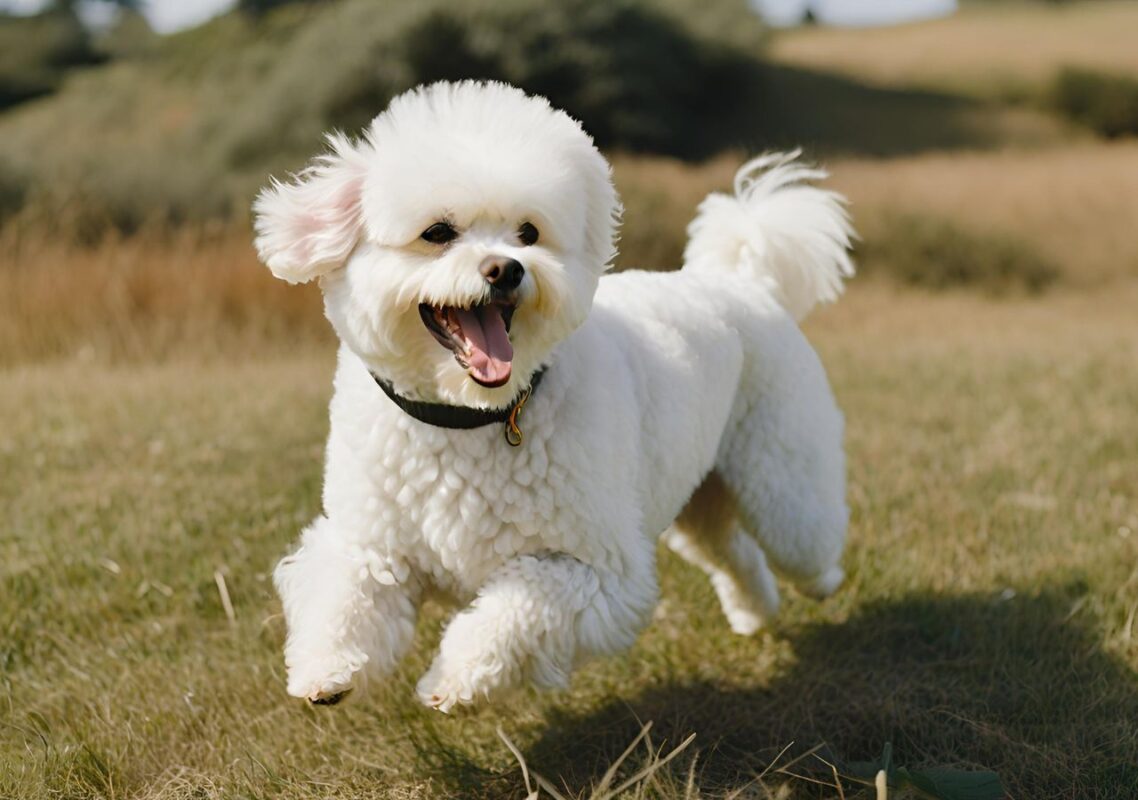
Despite their luxurious coat, Bichons are relatively low-maintenance when it comes to grooming. However, to keep their fur in top condition, regular brushing, bathing, and occasional professional grooming are necessary. This not only keeps their coat white and fluffy but also prevents matting and skin issues.
Bichon Frises make excellent pets for a wide range of people, including families with children, singles, and seniors. Their adaptable nature and moderate exercise needs mean they can fit into various lifestyles, as long as they receive enough attention and love.
In conclusion, the Bichon Frise is a delightful breed that offers companionship, joy, and a touch of elegance to any home. Their endearing qualities and manageable size make them an ideal choice for dog lovers looking for a loyal and affectionate companion.
Importance of coat care for health and appearance
Maintaining the coat of a Bichon Frise is not just about keeping them looking their best; it’s also crucial for their overall health and well-being. The unique, fluffy white coat of a Bichon Frise requires regular grooming to stay in prime condition. Proper coat care involves a combination of daily brushing, regular bathing, and professional grooming sessions, all of which play a vital role in the health and appearance of these charming dogs.
Health Benefits:
- Skin Health: Regular grooming helps prevent skin irritations and infections by removing dirt, debris, and dander from the coat. It also ensures that the skin can breathe and reduces the risk of matting, which can cause pain and skin damage.
- Early Detection of Health Issues: Grooming sessions provide an opportunity to check for signs of health issues, such as lumps, bumps, or sensitive areas that may require veterinary attention. Early detection can lead to more effective treatment.
- Parasite Control: Regular brushing and bathing help identify and manage parasites like fleas and ticks, which can cause serious health problems if left untreated.
Appearance Benefits:
- Maintains Coat Quality: The Bichon Frise’s coat is prone to matting and tangling. Regular grooming keeps the coat soft, fluffy, and tangle-free, which is essential for maintaining the breed’s characteristic look.
- Brightens the Coat: White coats can easily become stained or yellowed. Proper grooming, including the use of whitening shampoos, can help keep the coat bright and white.
- Promotes Even Growth: Regular trimming and professional grooming encourage healthy, even coat growth, ensuring your Bichon Frise looks well-kept and stylish.
Emotional Well-being:
Grooming sessions can also strengthen the bond between you and your Bichon Frise. Many dogs enjoy the attention and physical contact that comes with grooming, which can have a calming effect and reinforce their sense of security and belonging.
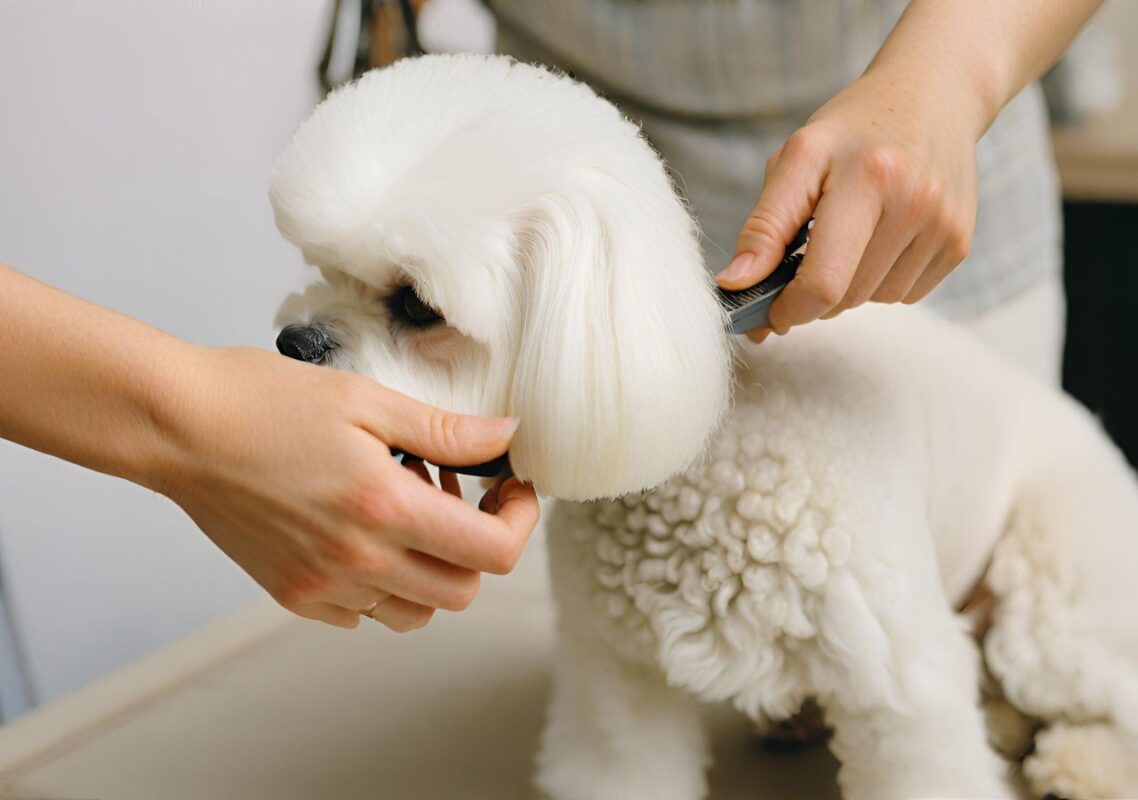
Moreover, grooming routines establish a sense of routine and predictability for your pet, contributing to their emotional well-being. It’s an opportunity for positive interactions that can include praise, treats, and affection, making it an enjoyable experience for both pet and owner.
In summary, regular coat care is indispensable for keeping your Bichon Frise healthy, happy, and looking their best. It goes beyond cosmetic benefits, affecting their physical health, emotional well-being, and the quality of life. Therefore, investing time and effort into proper grooming practices is essential for any Bichon Frise owner.
Understanding the Bichon Frise Coat
The Bichon Frise’s coat is one of its most distinguishing features, setting it apart with its soft, fluffy appearance. Understanding the unique characteristics of their coat and the challenges involved in keeping it pristine white is essential for any owner. This knowledge ensures the health and happiness of these delightful pets while maintaining their distinctive beauty.
Characteristics of the Bichon Frise Coat
- Double Coat: The Bichon Frise has a double coat, consisting of a soft, dense undercoat and a coarser, curly outer coat. This combination provides insulation and protection, but it also means the coat requires regular maintenance to prevent matting.
- Hypoallergenic: Though no dog is truly hypoallergenic, Bichons are often considered to be so because their coat produces less dander than many other breeds. This makes them a popular choice for allergy sufferers.
- Growth Pattern: Their hair grows continuously, similar to human hair, which means it requires regular trimming to maintain shape and health.
- Non-Shedding: Bichons are known for their minimal shedding. While this is beneficial for cleanliness and allergies, it also means their fur can mat and tangle without regular grooming.
Common Challenges in Keeping It White
- Staining: The pure white coat of a Bichon Frise can easily become stained from a variety of sources, including tear stains around the eyes, saliva around the mouth and paws, and urine on the belly and legs. Preventing and treating these stains requires regular attention.
- Environmental Factors: Mud, dirt, and grass can quickly turn a white coat into a canvas of stains. Frequent outdoor play and walks necessitate consistent grooming routines to keep the coat clean.
- Diet: The diet of your Bichon Frise can also impact the whiteness of their coat. Certain foods can lead to discoloration or staining of the fur, especially around the mouth.
- Sun Exposure: Prolonged exposure to the sun can cause the white coat to turn a yellow or beige color, diminishing its bright, white appearance.
- Health Issues: Some health issues, such as yeast infections or skin allergies, can lead to discoloration or staining of the coat. Regular veterinary check-ups are crucial to identify and treat any underlying health problems.
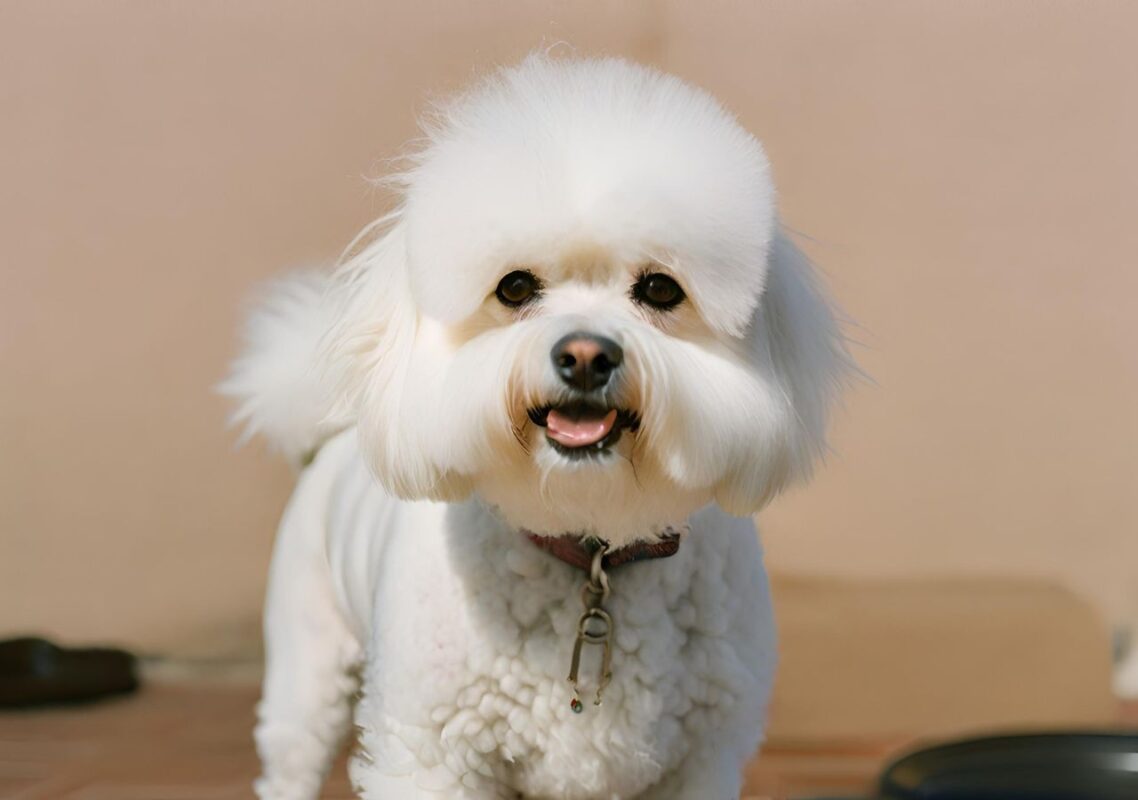
Keeping a Bichon Frise’s coat white and fluffy is undoubtedly a commitment, requiring regular grooming, careful attention to diet, and preventive measures against staining. However, with the right knowledge and tools, it is a rewarding task that ensures your Bichon Frise not only looks their best but is also healthy and happy.
Routine Maintenance for a White Coat
Maintaining the pristine white coat of a Bichon Frise requires a dedicated grooming routine. A systematic approach to coat care ensures not only the aesthetic appeal of a bright, white coat but also contributes significantly to the overall health and comfort of your pet. Here’s a comprehensive routine to help keep your Bichon Frise’s coat in optimal condition:
Daily Brushing
- Purpose: Regular brushing helps to remove dirt, debris, and loose hair, preventing matting and tangling. It also distributes natural skin oils throughout the coat, keeping it healthy and shiny.
- Tools: Use a high-quality slicker brush and a metal comb. Start with the slicker brush to gently work through the coat, removing tangles and mats, then follow up with the comb for a more thorough detangling.
- Technique: Brush in the direction of hair growth, paying special attention to areas prone to matting, such as behind the ears, under the legs, and around the collar.
Weekly Bathing
- Frequency: A weekly bath can help keep the Bichon Frise’s coat white and clean, but the exact frequency may vary based on your dog’s lifestyle and level of outdoor activity.
- Shampoo: Opt for a high-quality dog shampoo specifically formulated for white or light-colored coats. These shampoos often contain brightening agents that help remove stains and enhance the coat’s natural whiteness.
- Conditioner: A good conditioner is crucial for keeping the coat soft, manageable, and free from tangles. Look for products that are designed to moisturize and strengthen the coat.
Eye and Beard Care
- Tear Stains: Regularly clean the area around the eyes to prevent tear stains. Use a soft, damp cloth or a special tear stain remover recommended by your vet.
- Beard Stains: Clean the beard area after meals to prevent food-related staining. A damp cloth or pet-safe wipes can be effective for daily cleanups.
Professional Grooming
- Frequency: Schedule professional grooming sessions every 4 to 6 weeks. A professional groomer can trim the coat, clean the ears, trim the nails, and provide a thorough bath.
- Special Requests: Inform your groomer of any specific needs your Bichon Frise may have, such as sensitive skin issues or a preferred coat length.
Diet and Supplements
- Diet: Feed your Bichon Frise a balanced diet rich in essential nutrients. A high-quality diet contributes to a healthy coat from the inside out.
- Supplements: Supplements like omega-3 fatty acids can promote skin health and coat shine. Consult your vet for recommendations tailored to your dog’s needs.
Regular Check-Ups
- Veterinary Visits: Regular check-ups can help identify and address any health issues that may affect the coat’s appearance, such as allergies or skin infections.
Maintaining the white coat of a Bichon Frise is a rewarding challenge that requires consistent care and attention. By incorporating these maintenance routines, you can ensure your Bichon Frise’s coat remains beautiful, healthy, and vibrant, reflecting the care and love they receive daily.
Daily Grooming
Proper daily grooming is crucial for maintaining the health and appearance of your Bichon Frise’s coat. Regular brushing and combing not only keep the coat clean and tangle-free but also stimulate the skin, promoting healthy hair growth. Here’s how to effectively incorporate brushing and combing into your daily routine to prevent mats and ensure your Bichon Frise’s coat remains fluffy and white.
Brushing Techniques
- Select the Right Brush: For Bichon Frises, a slicker brush is ideal due to its fine, short wires that can easily reach through the coat to the skin, helping to remove loose fur and detangle.
- Gentle Approach: Start brushing with gentle strokes to avoid irritating the skin. Brush in the direction of hair growth, and be particularly gentle around sensitive areas such as the face and ears.
- Layer by Layer: To ensure you’re reaching all parts of the coat, use a technique called “line brushing.” Lift a layer of hair with one hand and brush the hair underneath, working your way down from the back of the head to the tail, and then moving to the sides and chest.
- Consistency is Key: Regular brushing sessions not only help to maintain the coat but also reduce shedding by removing loose hair before it falls out.
Combing for Mat Prevention
- Choosing a Comb: After brushing, use a metal comb with fine to medium-spaced teeth to go over the coat. This will help catch any tangles or mats the brush didn’t remove.
- Attention to Detail: Focus on areas prone to matting, such as behind the ears, under the armpits, and around the rear. These areas require special attention during each grooming session.
- The Right Technique: Comb through the coat gently, starting from the tips and working your way to the roots to avoid pulling on the skin. If you encounter a mat, hold the base of the mat with one hand to prevent pulling on the skin while gently teasing the mat apart with the comb.
- Regular Maintenance: Incorporating combing into your daily grooming routine helps prevent mats from forming and becoming tight, which can be painful for your dog and difficult to remove.
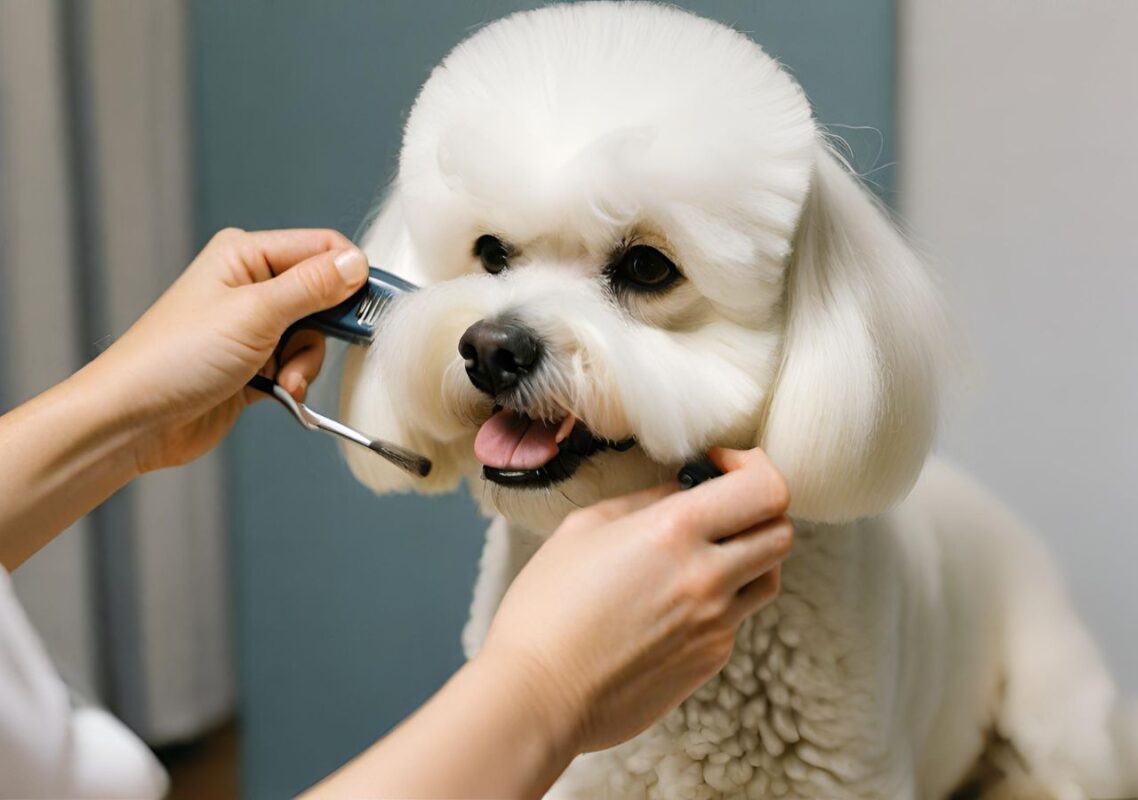
Daily grooming is an essential part of caring for your Bichon Frise, fostering not only a beautiful coat but also a strong bond between you and your pet. Through consistent brushing and combing, you’ll keep your Bichon’s coat in excellent condition, preventing mats and ensuring your furry friend is always looking their best.
Bathing Your Bichon Frise
Bathing is a key component of your Bichon Frise’s grooming routine, essential for keeping their white coat clean, healthy, and vibrant. However, finding the right balance is crucial, as both over-bathing and under-bathing can lead to skin issues and coat problems. Here’s how to determine the optimal bathing schedule and select the right products for your Bichon Frise.
How Often to Bathe Your Bichon Frise
- General Guideline: A good rule of thumb is to bathe your Bichon Frise approximately every 3-4 weeks. This frequency can help maintain their coat’s natural oils, which protect the skin and promote a healthy, shiny coat.
- Lifestyle Considerations: The ideal bathing frequency can vary depending on your dog’s lifestyle. Active dogs that spend a lot of time outdoors may require more frequent baths, while indoor pets might not need to be bathed as often.
- Observation: Pay attention to your dog’s coat and skin condition. If you notice it getting oily or if there’s a noticeable dirt build-up, it’s probably time for a bath. Conversely, if their skin becomes dry or flaky, you might be bathing them too frequently and need to adjust accordingly.
Selecting the Right Shampoo
- Formulated for White Coats: Choose a shampoo specifically designed for white or light-colored coats. These products often contain brighteners and whiteners that help restore and maintain the coat’s natural brilliance without harsh chemicals.
- Gentle and Natural: Look for shampoos with natural, gentle ingredients that won’t strip the coat of its natural oils. Ingredients like oatmeal, aloe vera, and coconut oil are excellent for soothing and moisturizing the skin.
- pH-Balanced for Dogs: Ensure the shampoo is pH-balanced specifically for dogs. Human shampoos and even baby shampoos have a different pH level, which can disrupt the acid mantle of your dog’s skin, leading to irritation or infections.
- Hypoallergenic Options: If your Bichon has sensitive skin, consider a hypoallergenic shampoo. These products are free from potentially irritating substances like fragrances and dyes, which can cause allergic reactions.
Regular bathing, when done correctly, is more than just a hygiene routine; it’s a health necessity for your Bichon Frise. By following these guidelines and choosing the right products, you can ensure that your furry friend remains happy, healthy, and as dazzlingly white as ever.
Diet and Nutrition
A nutritious diet plays a pivotal role in maintaining the radiant white coat and overall health of your Bichon Frise. The right balance of vitamins, minerals, and proteins not only supports their energy levels but also ensures their fur remains soft, fluffy, and white. Here, we’ll explore the best foods and supplements that contribute to a healthy coat and where you can find more in-depth information on feeding your Bichon Frise.
Foods for a Healthy Coat
- High-Quality Protein: Protein is the building block of a healthy coat. Look for dog foods that list real meat (chicken, beef, fish, or lamb) as the first ingredient. Fish, particularly salmon, is an excellent source of omega-3 fatty acids, which can help keep your Bichon’s coat shiny and skin healthy.
- Omega-3 and Omega-6 Fatty Acids: These essential fatty acids are key to maintaining a healthy coat and skin. While omega-6 acids are common in most pet foods, omega-3s might be less so. Adding fish oil to your dog’s diet can provide a good source of omega-3.
- Vitamins and Minerals: Vitamins A, E, and B-complex, as well as minerals like zinc and selenium, support skin health and fur growth. Many high-quality dog foods are fortified with these essential nutrients. However, always ensure that the diet is well-balanced to prevent vitamin toxicity.
- Antioxidants: Foods rich in antioxidants can help protect your dog’s skin and fur from environmental damage. Look for ingredients like blueberries, cranberries, and spinach in your dog’s food.
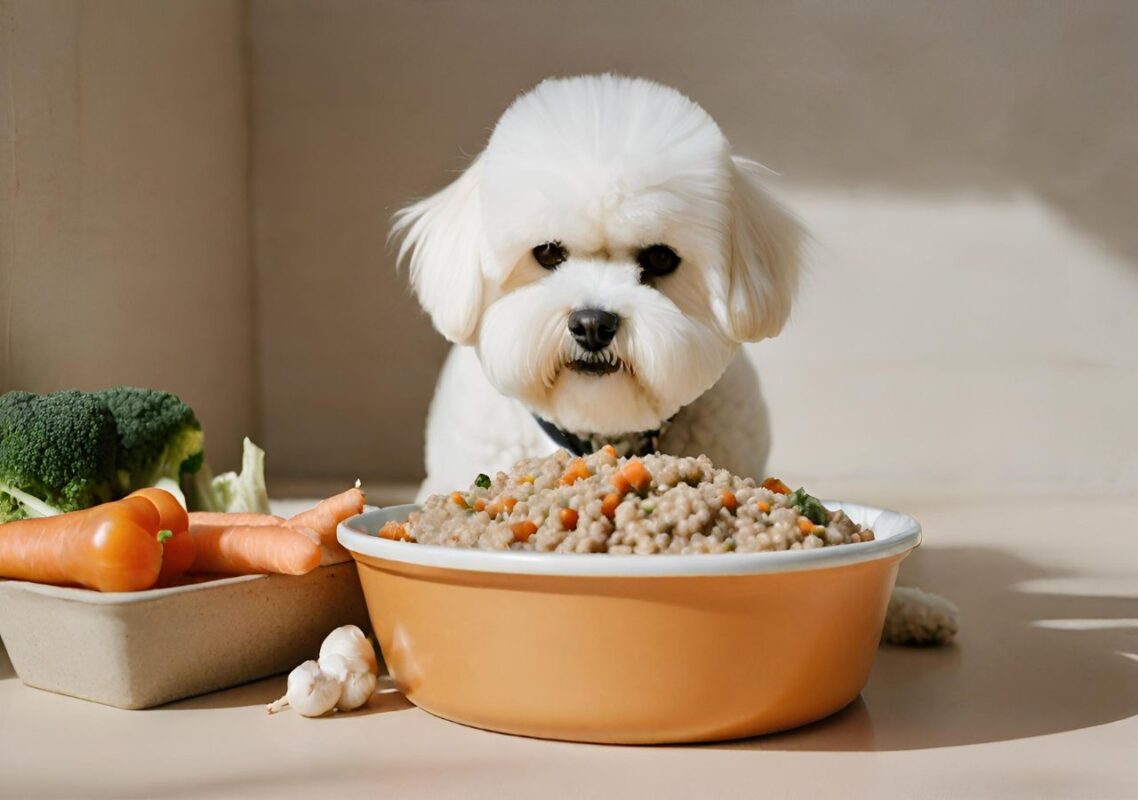
Supplements for Coat Health
While a well-balanced diet should provide most of the necessary nutrients for a healthy coat, some Bichon Frises might need an extra boost. Here are a few supplements that can help:
- Fish Oil: Rich in omega-3 fatty acids, fish oil supplements can enhance coat shine and reduce itchy and flaky skin. Always choose a high-quality product designed for dogs and consult with your vet for the proper dosage.
- Biotin: Biotin (Vitamin B7) supplements can help improve coat health, making your Bichon’s fur thicker and shinier. It’s also beneficial for skin health.
- Zinc Supplements: Zinc plays a crucial role in skin health and fur growth. If your dog’s diet lacks sufficient zinc, supplementation might help, but it’s essential to do so under veterinary guidance to avoid zinc toxicity.
For those seeking more detailed advice on feeding your Bichon Frise, consider reading our blog post titled “Comprehensive Guide to Bichon Frise Feeding Schedule: Essential Tips for Healthy Puppies,” published on November 29, 2023. This guide dives deeper into the specifics of what, when, and how much to feed your Bichon Frise to ensure they grow up healthy, happy, and with a coat that’s as white as snow.
Addressing Stains and Discolorations
Stains and discolorations are common issues for Bichon Frises, given their pure white coats. These can detract from the beauty of their appearance if not properly managed. Here, we’ll explore how to address and prevent these common problems, keeping your Bichon Frise looking their best.
Tear Stains
Tear stains are reddish-brown streaks that appear beneath the eyes of many Bichon Frises. They are caused by excessive tear production which, when mixed with bacteria and yeast, can lead to noticeable staining.
- Prevention and Cleaning: Regular cleaning is essential to prevent buildup. Use a soft, damp cloth or a cotton ball to gently wipe the area daily. Special tear stain removers are available but choose one carefully, ensuring it’s safe for use around the eyes.
- Check for Health Issues: Persistent tear staining can be a sign of health issues like blocked tear ducts or allergies. Consulting with your vet can help address the underlying cause.
Paw and Mouth Stains
Stains around the mouth and paws can be caused by food, saliva, or even the minerals found in drinking water.
- Regular Grooming: Regularly trimming the fur around the mouth and paws can help reduce staining. Use a small, rounded-tip grooming scissors for safety.
- Dietary Adjustments: Consider switching to high-quality, natural foods to reduce saliva staining. For paw stains, cleaning your dog’s paws after they go outside can prevent stains from setting in.
- Filtered Water: Sometimes, switching to filtered water can help reduce staining caused by minerals in tap water.
Safe Cleaning Methods
When addressing stains and discolorations, it’s crucial to use safe, non-irritating products.
- Choose the Right Products. Look for grooming products specifically designed for dogs with white coats. These are formulated to safely remove stains without harsh chemicals.
- Natural Remedies. For a more natural approach, diluted apple cider vinegar (used sparingly and carefully) can help remove stains. Always test a small area first and rinse thoroughly.
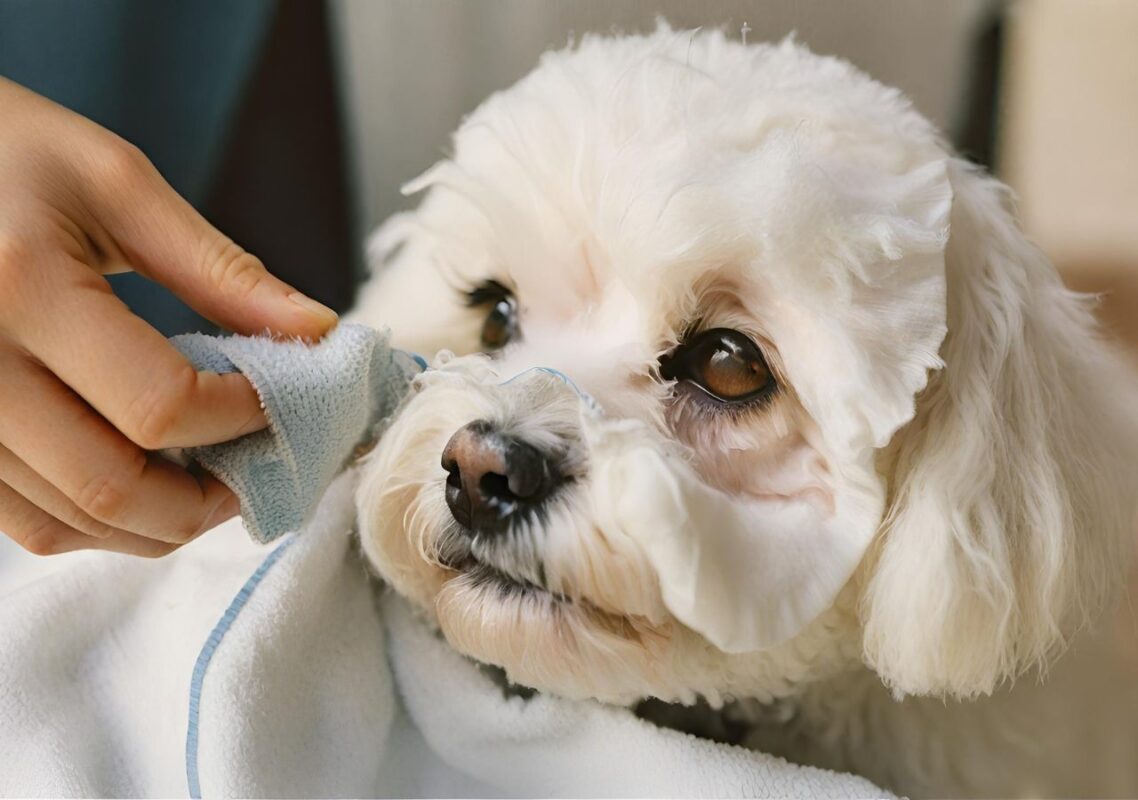
Professional Grooming
If stains and discolorations persist, consulting a professional groomer can be beneficial. They can provide deep cleaning treatments and recommend specific products tailored to your dog’s needs.
Maintaining a Bichon Frise’s sparkling white coat requires diligence, especially when it comes to preventing and treating stains. By incorporating these tips into your grooming routine, you can ensure your Bichon Frise remains as stunningly white and fluffy as ever, showcasing their true beauty to the world.
Professional Grooming Tips for Your Bichon Frise
While regular home grooming is essential for maintaining your Bichon Frise’s coat, professional grooming services offer specialized care that goes beyond what most pet owners can achieve at home. Understanding when to seek professional grooming and knowing what to expect can help you ensure your Bichon Frise looks and feels their best.
When to Seek Professional Grooming
- Routine Maintenance. Schedule professional grooming sessions every 4-6 weeks. This frequency supports the health of your Bichon Frise’s coat and skin, while also keeping their nails, ears, and teeth in good condition.
- Before Special Occasions. If you have a special event or photo session, a professional grooming session can ensure your Bichon looks their best, showcasing their fluffy, pristine white coat to its fullest.
- When You Notice Specific Needs. Should you encounter difficult mats, skin issues, or other grooming challenges that you’re not equipped to handle, it’s time to call in a professional. They have the tools and expertise to address these issues without causing stress or harm to your dog.
What to Expect from a Professional Groomer
- Consultation. A good professional groomer will start with a consultation to discuss your Bichon Frise’s specific needs, your preferences for their haircut, and any concerns you might have, such as sensitive skin or allergies.
- Comprehensive Services. Professional grooming typically includes a bath with dog-specific shampoo, blow-drying, thorough brushing, ear cleaning, nail trimming, and a haircut according to the breed standard or your personal preference.
- Expertise in Handling. Professional groomers are trained to handle dogs of all temperaments and conditions. They know how to calm anxious pets and safely manage those who might not enjoy the grooming process.
- Advice and Recommendations. After the session, the groomer can offer advice on how to maintain your Bichon’s coat between visits and recommend products or techniques suited to your dog’s specific needs.
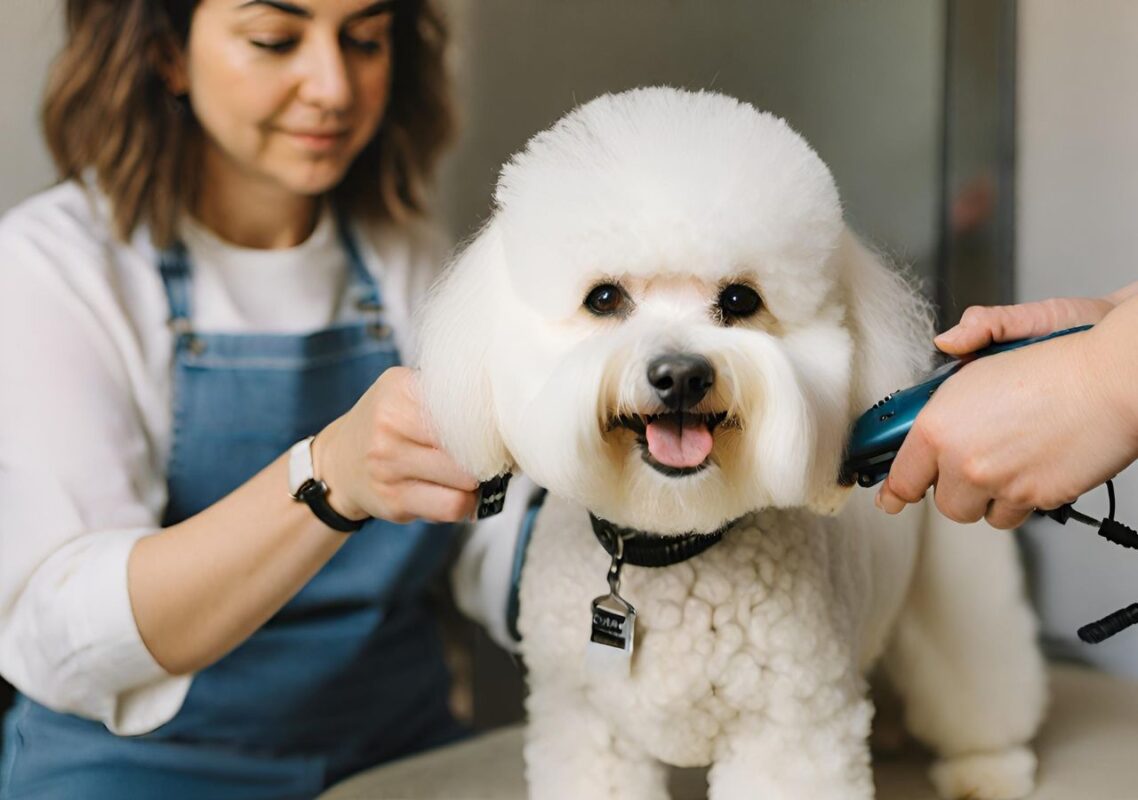
Choosing to invest in professional grooming services for your Bichon Frise not only ensures their coat is beautifully maintained but also contributes to their overall well-being. A professional groomer provides a level of care and expertise that can enhance your pet’s quality of life, making each session a worthwhile investment.
Health Considerations
A healthy, white coat in a Bichon Frise is not just a matter of grooming; it’s also a reflection of the dog’s overall health. Certain health issues can directly impact the quality of your Bichon’s coat, making regular veterinary care crucial for maintaining its pristine condition. Understanding the common health issues that can affect coat quality and the importance of regular vet visits will help you keep your Bichon Frise looking and feeling their best.
Common Health Issues Affecting Coat Quality
- Skin Allergies. Allergic reactions to environmental factors, food, or parasites can lead to skin irritation, resulting in a dull coat, itching, and even hair loss. Identifying and managing allergies is key to restoring coat health.
- Hormonal Imbalances. Conditions such as hypothyroidism can lead to a variety of symptoms, including a brittle or thinning coat. If you notice significant changes in your Bichon’s coat or general health, a veterinary check-up is necessary.
- Nutritional Deficiencies. A diet lacking in essential nutrients, vitamins, and minerals can affect your dog’s coat, making it appear dull and lifeless. Ensure your Bichon Frise is on a well-balanced diet that meets their specific needs.
- Parasitic Infections. Fleas, ticks, and mites not only cause discomfort but can also lead to skin infections and coat damage. Regular preventative treatments are essential to keep these parasites at bay.
Regular Veterinary Care for a Healthy Coat
- Annual Check-Ups. Regular check-ups allow your vet to catch any potential health issues early on, including those that may affect your Bichon’s coat. These visits often include blood tests, skin examinations, and nutritional assessments.
- Customized Diet Plans. Based on your Bichon’s health, age, and activity level, your vet can recommend a diet that supports coat health. This might include specific dog foods or supplements rich in omega-3 fatty acids, which are known to promote a shiny, healthy coat.
- Skin and Coat Assessments. Your vet can offer advice on managing common skin conditions and recommend topical treatments or medicated shampoos that address your dog’s specific needs.
- Preventative Care. Stay up to date with vaccinations and parasite control to prevent diseases that can affect your Bichon’s coat and overall health.
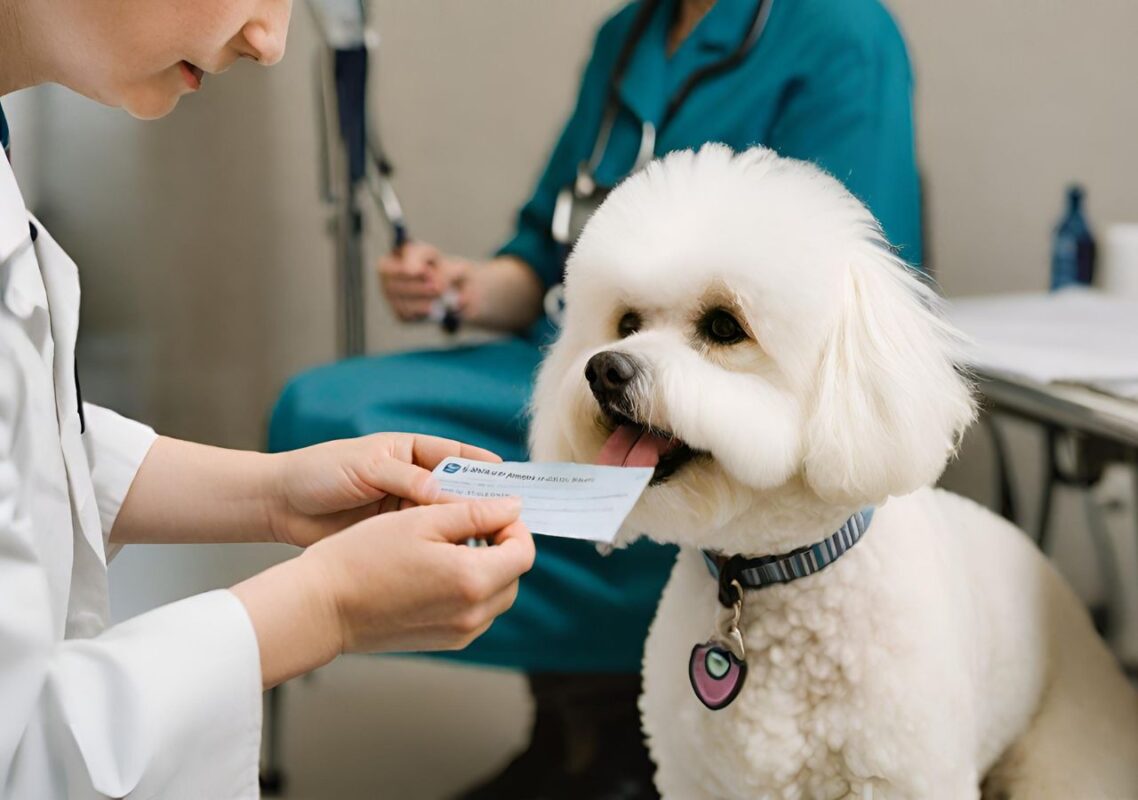
Proactive health management plays a crucial role in ensuring your Bichon Frise’s coat remains as beautiful as it is healthy. By addressing health issues promptly and following your vet’s recommendations for care and nutrition, you can help your Bichon maintain their distinctive, fluffy white coat throughout their life.
Recommended Products for a White Coat
Keeping a Bichon Frise’s coat white, fluffy, and healthy requires the right grooming products and dietary supplements. Below, we highlight essential items specifically designed for the care of a Bichon’s distinctive coat and skin, including a selection of specialized products that cater to the unique needs of this breed.
Shampoos and Conditioners
- Bichon Frise Conditioner. This conditioner is specially formulated to enhance the natural whiteness and texture of your Bichon’s coat. Infused with natural ingredients, it helps to detangle, moisturize, and bring out the brightness in their fur, leaving it silky and vibrant after every wash.

Grooming Tools
- 2 In 1 Cleaning Brush. This versatile grooming tool combines the functionality of a de-matting comb with a gentle bristle brush, making it perfect for tackling mats while softly stimulating your Bichon’s skin for a healthy coat growth.
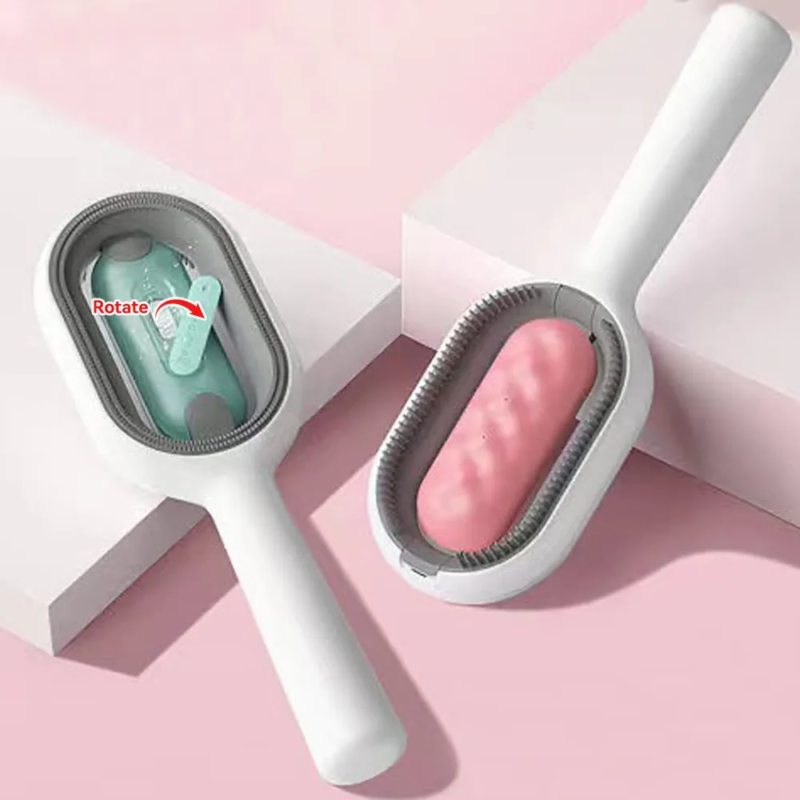
- 3-In-1 Pet Hair Dryer. An innovative grooming tool that combines drying, brushing, and styling functionalities in one. It’s designed to make grooming sessions more efficient, providing gentle heat and a comfortable brush that works perfectly for a Bichon’s sensitive skin and delicate coat.

- Bath Brush for Bichon. Designed to enhance the bathing experience, this brush helps to deeply clean the coat, removing dirt and loose fur while massaging the skin. Its gentle bristles are ideal for a Bichon’s skin, stimulating circulation and helping to distribute natural skin oils for a healthier coat.

Supplements and Diet Enhancements
- SOS Bichon Frise Hair Solution 365ML. A nutritional supplement designed to promote healthy coat growth and repair. This solution can be added to your Bichon’s diet to support skin health from the inside, providing essential vitamins and minerals that foster a vibrant, white coat.

Specialized Care Products
- Bichon Paw Cream. Protecting your Bichon’s paws is crucial, especially after grooming sessions. This cream offers deep moisturization, healing cracks, and preventing dryness, ensuring your pet’s paws stay soft and protected against harsh surfaces.

- Crystal Clear Vision: NiyaPet Eye Cleaning Wipes. These wipes are a must-have for maintaining the area around your Bichon’s eyes. Specially formulated to be gentle yet effective, they remove tear stains and debris, preventing irritation and keeping your Bichon’s face looking clean and bright.

Each of these products plays a pivotal role in the comprehensive care of a Bichon Frise’s coat and skin. Incorporating them into your regular grooming routine can significantly enhance the health, appearance, and comfort of your Bichon, ensuring they always look their best.
DIY Remedies and Care
Maintaining the radiant white coat of a Bichon Frise doesn’t always require expensive products or professional services. Simple, homemade remedies and attentive care can significantly contribute to the brightness and health of your pet’s fur. Here are some DIY tips and a summary of the do’s and don’ts of at-home grooming.
Home-made Recipes for Coat Brightness
- Natural Whitening Rinse: Mix one part apple cider vinegar with three parts water to create a rinse that can help brighten your Bichon’s coat. After shampooing, pour the mixture over your dog’s coat, let it sit for a few minutes, and then rinse thoroughly. The natural acidity of apple cider vinegar can help remove stains and brighten the fur.
- Coconut Oil Treatment: Coconut oil is excellent for adding shine and softness to your Bichon’s coat. Warm a small amount of coconut oil in your hands and gently massage it into the coat, focusing on dry or dull areas. Leave it on for a few minutes before bathing your dog as usual. This treatment also helps moisturize the skin.
Do’s and Don’ts of At-Home Grooming
Do’s:
- Do use the right tools. Invest in quality grooming tools suitable for a Bichon Frise’s coat, such as a slicker brush, a fine-toothed comb, and professional-grade shampoos.
- Do be gentle. Always groom with care to avoid irritating your dog’s skin or pulling painfully on mats and tangles.
- Do maintain a routine. Consistency is key to keeping your Bichon’s coat in top condition. Establish a regular grooming schedule.
Don’ts:
- Don’t bathe too frequently. Over-bathing can strip the coat of natural oils, leading to dry, irritated skin. Stick to a reasonable schedule, usually once every 3-4 weeks.
- Don’t neglect the ears and eyes. These areas require special attention to prevent infections and tear stains. Use appropriate products and techniques for cleaning.
- Don’t ignore the paws. Regularly check and clean your Bichon’s paws, and apply paw cream to prevent cracking and dryness.
Conclusion
Maintaining the stunning white coat of a Bichon Frise is a rewarding challenge that requires knowledge, patience, and consistency. From understanding the unique needs of their coat to implementing a regular grooming routine, every step taken contributes to the health and happiness of your furry friend. We’ve explored professional grooming tips, recommended products, and DIY remedies that all play a role in achieving and maintaining that iconic Bichon brightness and fluffiness.
Recap of Key Points:
- Regular brushing, bathing, and professional grooming are essential for a healthy, white coat.
- Choosing the right products, like specialized shampoos and conditioners, supports coat health.
- Dietary considerations and supplements can enhance coat quality from the inside out.
- Attention to detail, especially around sensitive areas like the eyes, ears, and paws, is crucial.
Encouragement for Consistent Care
Your Bichon Frise’s coat is a reflection of your care and attention. By embracing the responsibilities of grooming with love and dedication, you not only ensure your pet looks beautiful but also feels loved and cherished. Remember, the bond between you and your Bichon Frise grows stronger with each grooming session, turning routine care into moments of connection and affection. Keep up the great work, and enjoy the beautiful results of your consistent care.
FAQs
How to keep a Bichon Frise’s coat white?
For a white Bichon Frise coat, brush daily and bathe monthly with a whitening shampoo. Use pet wipes for stains around the mouth and eyes. Add omega-3 rich foods to their diet. Regular vet check-ups are crucial too.
How often should I groom my Bichon Frise?
Brush your Bichon daily. Bathe every 3-4 weeks and consider professional grooming every 4-6 weeks for haircuts and thorough cleaning.
Can diet affect my Bichon Frise’s coat?
Yes, a balanced diet with essential nutrients and omega-3 supplements promotes a shiny, healthy coat.
What are the best tools for grooming a Bichon Frise at home?
Use a slicker brush, fine-toothed comb, quality scissors or clippers, and dog-specific shampoo and conditioner for white coats.
How can I prevent tear stains on my Bichon Frise?
Clean around the eyes with soft cloths or eye wipes regularly. Use filtered water and consult your vet for health issues.
Is it necessary to use a conditioner on my Bichon Frise’s coat?
Yes, conditioner keeps the coat soft and manageable, easing brushing and preventing mats. Choose a dog-formulated product for white coats.
Following these guidelines helps maintain your Bichon Frise’s coat, ensuring it stays healthy, white, and fluffy.


